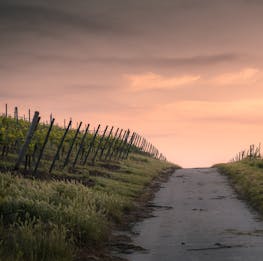Samuel Johnson famously stated: 'When a man is tired of London, he is tired of life, for there is in London all that life can afford.' Bill Bryson extends this sentiment in what can best be described as a love letter to the United Kingdom.
Written in 1995, as a way of temporarily bidding farewell to a place he'd called home for two decades, Notes from a Small Island takes us on a proverbial trip down memory lane. We join Bryson in exploring a quirky and captivating version of the UK, that we're unlikely to get from anyone else.
By writing in both the past and the present, Bryson weaves together insights into what has changed, and what has stayed the same. And, for a contemporary reader, it's a fascinating insight into a small island, brimming with history and stories.
Bill Bryson is a British-American author who has written on travel, language, history, domesticity, and other fascinating non-fiction topics. Growing up in Des Moines, he found himself yearning for a bigger world, and so he embarked on numerous adventures from the supremely ordinary, to the extraordinary. Bryson has a self-deprecating honest approach to writing, and draws on his own experiences of growing up in a small town.
Let's briefly take a journey through the United Kingdom. Although it was written over two decades ago, Notes from a Small Island is the ultimate travel companion for anyone looking at traveling to the UK. It's a place filled with the banal and the everyday, but it's also interspersed with the dazzling, the epic, and the truly extraordinary. In Bryson's own words: 'That is its glory you see - that it manages at once to be intimate and small-scale, and at the same time packed to bursting with incident and interest.' This is seen in how the British name things, how they delight in a hot cup of tea and a few biscuits, and how the older sector of society fixates on the mysterious counterpane. And isn't it extraordinary that a culture that's surrounded by so much depth, finds so much delight in the smallest pleasures?
Traveling Everywhere By Public Transport
If you were to tell anyone that you were traveling a country using nothing but their public transport system, you'd likely get the same response that Bryson received. 'Gosh, you're brave!' And it's not that their public transport system is bad, it's just that there are some, let's call them quirks, that you need to wrap your head around.
The first thing is asking for directions in the UK. Suppose you happen to find yourself asking someone for directions. In such a case, it's important to note that their response is deep-rooted and culturally specific. The UK citizen delights in vacillating over the best way to get somewhere, so if you have time to waste, this can appear charming. When they're in a group, discussions about directions can take infinitely longer. So it's worth being forewarned about this because if you're in a rush, it can hinder progress somewhat.
Bill Bryson hates cars, so one needs to take his "avoid driving at all costs" advice, with a pinch of salt. However, there's truth in the recommendation not to drive in the UK, not least because of the congestion. Parking is a particularly offensive pursuit, and is likely to rattle even the most zen amongst us. Parking is limited, to say the least, and the spaces are the definition of "tight." What's more, the "Pay and Display" machines are akin to finding and then operating the Death Star. In short, there's a lot to moan about when it comes to cars, but there are times when even Bill Bryson himself has to bite the bullet and opt for a hire car.
Traveling by train isn't perfect, but it can be glorious. Some advice for first-time travelers; signs can be incorrect, and technology can malfunction at any time. Frequently there are no visible signs to where the train is going, and announcements are not always clear. The culture dictates that you should form an orderly queue in such circumstances, and then ask a British Rail employee whether this is the train to where you need to go. Once you've ascertained this, you step onto the train, and then double-check with the other train passengers. Second-guessing oneself is an integral part of fitting in with the locals. Another noteworthy practice, is that of stringent routine. Seasoned commuters sit on the same seat every day, and they stand on precisely the same spot on the platform. You'll likely anger a seasoned commuter at some point for encroaching, but luckily the average UK citizen has been bred to favor politeness over all else.
For every rule, there's an exception. Meet the "Vodaphone Man." You've probably met the Vodaphone Man somewhere along your road to life. You'll recognize him immediately; he's the one who is incessantly chatting on his cellphone, polluting the train carriage with nonsense about "running things up the flagpole," and "chasing up on China." And, despite being written in the mid-nineties, we can all recognize the Vodaphone Man in contemporary everyday life, and greet him or her, with a well-timed roll of the eye.
Here, Bryson offers some prudent advice: 'Over a long period of time, it gradually dawned on me that the sort of person who will talk to you on a train, is almost by definition the sort of person you don't want to talk to on a train…'
Another thing to note, whether traveling by train or bus, is that the timetables can be tricky, and there are times when they will make no sense. You should plan in advance, and if you're visiting in winter, or traveling on a Sunday, you need to know that parts of the country will be closed off to public transport.
Despite some of the challenges of British public transport, and the fact that at some point you'll have to hire a car, it's difficult to moan about British Rail given the statistics. Did you know that the UK spends £5 per person per year on its rail system, whereas in Germany it's £20, and £50 in Switzerland?
And while we're here, if you find yourself traveling by double-decker bus, always sit in the front row, on the top level.
An Exploration of Towns and Villages
Inspired by the Ladybird book, Adventure on the Island, Bryson has an important quest, and that's to find the perfect UK village. There are numerous picturesque places in the UK, but many villages have lost their charm.
Bryson argues that many villages look the same: they're formulaic, they all have the same shops, they're inundated with franchises, and they're entirely indistinguishable. In short, there are very few surprises in the average town center, and the dreaded chain store is replacing most town centers and high street shops. There's nothing wrong with modernization, per se, but shop fronts are festooned with advertising or ugly signage. What used to be old monuments, have now been ruined by fakery and poor town planning.
Virginia Water is one of the more fascinating English towns. This is not least of all because it was the catalyst in convincing Bryson to stay in the UK, rather than going back home to America. Bryson's foray into working life in the UK was working in a sanatorium in Virginia Water. The patients mostly took care of themselves, leaving Bryson ample time to discover his love for biscuits, and practice his sock sliding skills. Most importantly, it's where he met his wife. Virginia Water has changed, but Bryson reveals a beautifully symbiotic relationship between the so-called "normal" members of society, and the outliers, or in those days, those who were termed "lunatics." It was one of the most extraordinary communities in England, where the wealthy, and those with extreme mental illness, lived on equal terms. Perhaps this is one of the most enlightening messages, and shows that we need to reexamine how we approach outliers, and how they're often forced onto the outskirts of society. Since Bryson's first visit in the seventies, much has changed in Virginia Water, but there are remnants of those forgotten years, if you look closely enough.
Few villages can rival Woodstock in terms of charm. It embodies a lot that is quintessentially British, including Georgian houses, gleaming brass, and old-fashioned signage. More importantly, it's home to Blenheim Palace. There are a great many palaces in the UK, but Blenheim is the one that you should go to immediately.
An Exploration of Cities
You'd be selling yourself short to think that the UK is just about London. Nonetheless, London is a vast dense labyrinth, brimming with history and architecture. As a tourist, it can be a bit of a nightmare to navigate. Did you know that there are approximately 45687 road names in London? Among these are 21 Gloucester Roads, 32 Mayfields, 35 Cavendishes, and 111 Station Roads.
This may not seem like a big deal, but when one considers the London cab driver, they're a marvel in human data capture, to be able to remember all of this. The traditional London cab driver memorizes the entire city, and it's their job to know the best routes. However, as with all humans, they can sometimes malfunction and take a wrong turn, in which case they'll reveal their incapacity to admit defeat.
The London Underground is a system of industrial genius. Not only is the train system itself a magnificent maze, but the map of the Underground, designed by Harry Beck, is an extraordinary achievement in the distortion of scale. The Underground Map has no relative scale, so understanding distance isn't easy. What's easy however, is navigating one's way around the complex network above and below ground. A word of advice though, don't be fooled into thinking that taking "the tube" is always quicker than walking, and never meet a friend at Brompton Road Station.
London has history, parks, the press, theatres, orchestras, museums, courteous inhabitants, red pillar boxes, and obscure statues. It's also got an abundance of forgotten squares, pubs, black cabs, double-decker busses, benches everywhere, people who willingly offer directions, the Underground, and plaques giving you historical background. But, as with everywhere else, some things are wrong about the city, such as the parking situation, modernizing things too much, and removing red phone boxes.
However, the UK is more than just the city of London. Liverpool was a once-bustling city and became the third most prosperous city in the Empire. In 1966 it was the busiest port in Britain, but by 1985 it lost most of its wealth. Despite this, the Merseyside Museum and an abundance of excellent pubs make it an essential stopover. Did you know that Blackpool attracts more visitors per year than Greece? It consumes more french fries than anywhere else, and annually 6.5 million people descend on Pleasure Beach.
Not All Hotels and B&Bs are Created Equal
Accommodation in the UK isn't cheap, so it's just as well we have the penny-pinching Bryson to give us his top tips on selecting a place to bed down for the evening.
Hotels and Bed and Breakfasts come in a range of shapes and sizes. Many of them will comprise wandering corridors and fire doors, and will offer the resident an incredible labyrinth to lose oneself in. This could be particularly unnerving if one were to meet the fussy scowling owner in slippers and a gown. Fussy owners are part and parcel of the Bed and Breakfast experience.
The Residents' Lounge is another oddity in the experience, and you're bound to meet a range of characters along the way. It's been said, that "travel broadens the mind," which is epitomized when Bryson explained to a fellow resident that he was visiting from America. This was met with the exclamation... 'Fancy! So what brings you to Britain then if you have Cornflakes already?'
Besides giving us insight into what to expect from accommodation options, we're also told how to get the most value out of a hotel stay. The first thing is to try your hand at hotel room Olympics, use the trouser press even if you don't need to, steal the soap, and never leave a piece of stationery behind. As a fun fact, Bryson asserts that tipping every gel, shampoo, foam bath, and moisturizer into the bath, results in a magical spa-like sensation.
Dinner for One
Dining as a lone traveler can be disconcerting. Eventually, everything starts to taste the same, and the illusion of choice will begin playing on your mind. The rise of the "foodie" and "gastro everything," has meant that menu items are no longer straightforward in some restaurants. And yes, sometimes style will trump substance.
However disappointed you may find some of your meals along the way, there are two saving graces if you need cheering up. The first is curry, which is generally always excellent, and the second is the most joy-bringing of all; the great British pudding. But remember, in a place where politeness is the order of the day, if you're a lone diner, occupying a table for four will make you universally hated.
An Argument for Communism
Bryson is partial to a tangent. Some of his more obscure tangents involve things like the etymology of the word "grapefruit," and why jerseys are called "jumpers." His musings on Communism are that it would have been done properly if left to the Brits.
This is because people in the UK are naturally predisposed to going without, pulling together for the common good, they're not averse to queuing, and they've dealt with rationing. They're renowned for their bland palates, and they're used to shortages of staple goods. What's more, they lived to tell the tale of Maggie Thatcher. They also have the spirit of laughing things off, being uncomplaining, and joking about authority without needing to change it. Plus, most of them are in favor of a utilitarian dress code. And while this isn't to say that Britain would have been better under Communism, they certainly have the right spirit for it.
Parks and Recreation
The UK is brimming with parks. There's the obvious Windsor Park, 40 square miles of varied flora and fauna, including everything from woodlands, farms, footpaths, and manicured lawns. It also contains a veritable cornucopia of treasures that were gifted to the Queen. For those of us who've received gifts we're not sure about giving house room to, this example shows that the best place to stash a rogue obelisk, is in a park. And as another bit of cheer, for anyone who wants to do a bit of "Royal Spotting," they're the only ones allowed to use the road within the park. So if you see a car, it's likely being driven by a member of the Royal Family.
Walking and ambling are perhaps the greatest of all British pastimes. One could be mistaken for assuming that walking is a leisurely and pleasant pursuit, but anyone who has met someone from the UK, knows that they're not shy of a euphemism. Hence, walking and ambling seem innocuous, but they may just finish you off. As an introduction to walking, there are two types. There's walking to get you from A to B, i.e., to the pub, shops, and so on. Then there's the other type that involves an unofficial uniform, a backpack with essentials, and tucking one's trousers (pants) into one's socks. Walking is difficult enough in most places, but when you add the elements thrown towards you by a great British winter, it's an entirely new experience in fortitude. Bryson's sage advice is, 'The trick of successful walking, I always say, is knowing when to stop.'
The Things They've Built
Did you know that there are 445000 listed buildings and 12000 medieval churches in the UK? Did you know that it took six hundred men to drag 50 tons of stone 18 miles, to build Stone Henge? And not only that, but they had to repeat the process twenty times.
Salisbury Cathedral and Lincolnshire Cathedral should be on any tourist's list. Still, if you want something special, it really is all about Durham Cathedral, which Bryson dubs "the greatest on planet earth."
Perhaps the most astonishing thing that the Brits built is the hedgerow. Hedgerows don't seem like they're worth a second thought, but many are a lot older than most of the other tourist attractions in the country. Did you know between 1945 and 1985, England lost 96000 miles of hedgerow? This exercise in destruction means that we lost enough hedgerow to circle the earth four times.
The thing about the UK is that there are pieces of history everywhere. For example, if you happen to find yourself in the Cotswolds and are an intrepid rambler like our author, it's worth hiking up Cole's Hill to find a spot called Roman villa (remains of). More often than not, we need to traipse into museums to see ancient remains, especially in a country such as the UK. But, if you find yourself atop Cole's Hill, and if you look hard enough, there's an ancient Roman mosaic accompanied by an enchanting view.
However, amongst all of this industrious building and development, they haven't managed to build decent drainage.
Being British
The British sense of humor can be both infuriating and delightful. Bryson has taken to it like a duck to water, and he relishes in any opportunity to school someone on how best to converse. Conversation is like a game of chess, and there are those who understand the game, and those who don't.
For example, upon entering a hotel, soaking wet from the rain outside, the receptionist asked Mr. Bryson whether it was raining out. His response, 'No, my ship sank, and I had to swim the last seven miles.' Her response? 'Oh yes?... And will you be dining with us tonight? This example is a classic lesson in the subtle art of "taking the piss." In many other cultures, taking the piss, or taking the Micky out of someone, isn't well understood. However, as much as the Brits take the piss and resort to irony, they've also made being polite a national pastime. Being British is about adopting a stiff upper lip, and accepting things that you might not want to. You'll frequently hear phrases such as, 'Well, it's hard to say no,' or beginning a sentence with, 'I'm terribly sorry.'
One should also be prepared to talk about the weather. A lot. 'To an outsider, the most striking thing about the English weather is that there isn't very much of it.' And you should also accept that they love animals. Did you know that the National Society for the Prevention of Cruelty to Children, was formed sixty years after the founding of the Royal Society for the Prevention of Cruelty to Animals?
In Conclusion
Notes from a Small Island isn't just about the UK, and all it offers in terms of sightseeing and tourist attractions. One of the key takeaways is that despite their "keep calm and carry on" personas, the British are an incredibly happy nation. If you observe them in conversation, it won't be long before they're sharing jokes, engaging in banter, and laughing over shared stories. They also take pleasure in the small things. Bryson refers to the typical British treat as, "cautiously flavorful." And yet, there's nothing that brings more joy than the offering of a bland biscuit and a hot cup of tea. The argument here is that a happy life is linked to modesty and being slightly averse to anything excessive. The British are happy because their mentality isn't to grumble; it's to make do, not to moan, to grin and bear it, and to use phrases such as, 'it was quite nice, really.'
This brief farewell to his beloved yet flawed small island, makes us who have visited want to return. It also makes those who live there grateful, and for those who have yet to visit, you might want to consider the quirky and unorthodox charm of an island brimming with history and idiosyncrasies.
And as a final message from the author. There are three reasons to be happy. 'First, you were born,' 'Second you're alive,' and third 'you have plenty to eat, you live in a time of peace, and 'Tie a Yellow Ribbon Round the Old Oak Tree' will never be number one again.'




